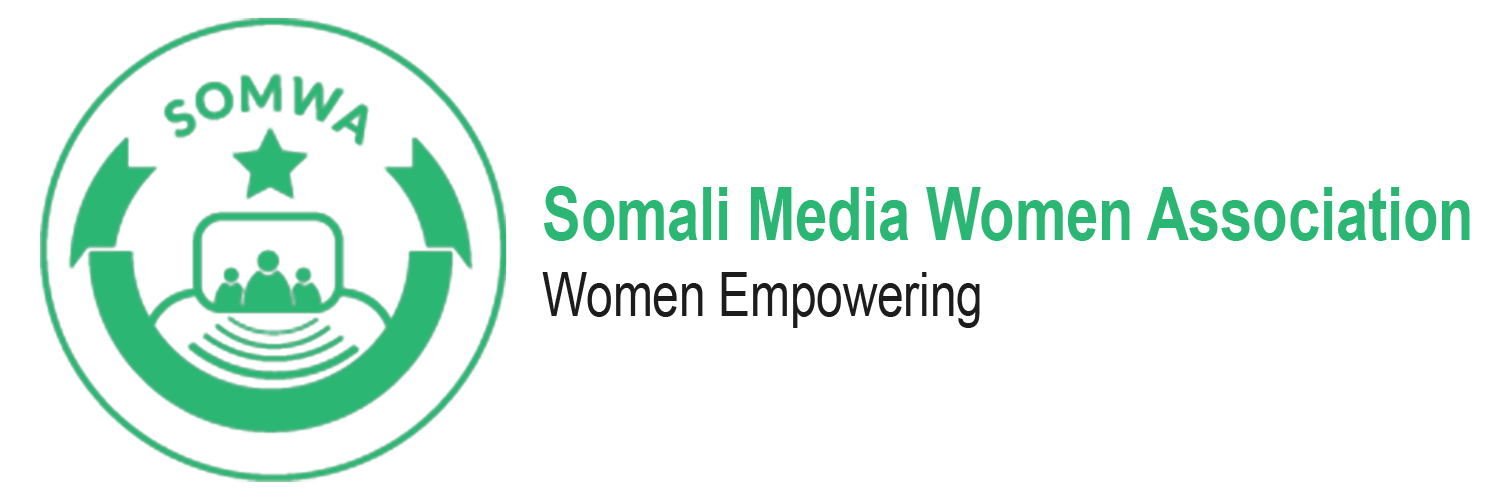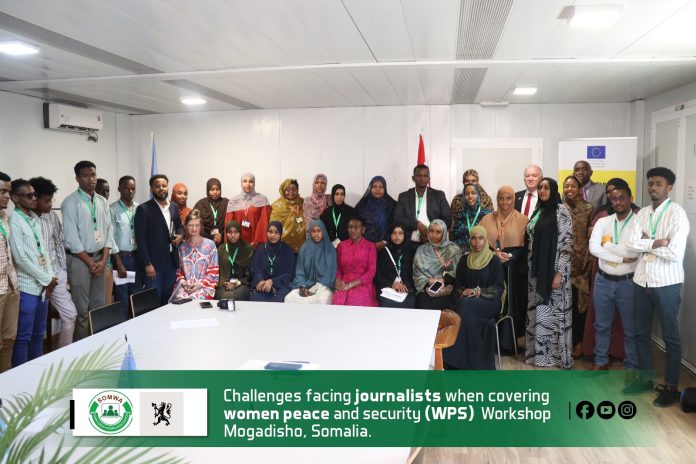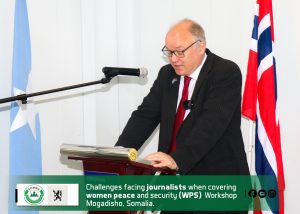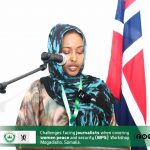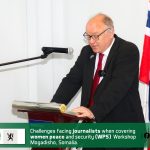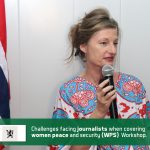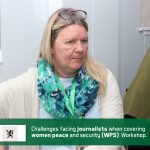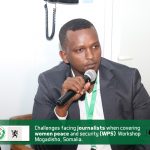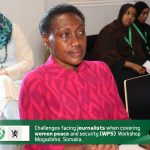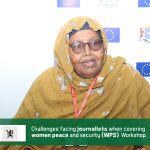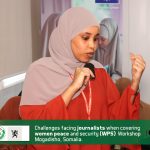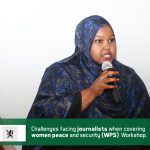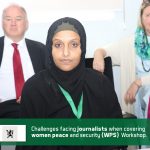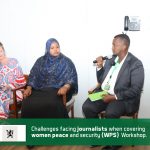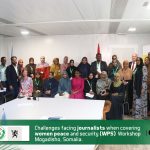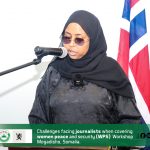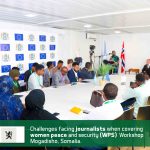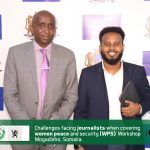In today’s rapidly evolving global landscape, the role of the media extends far beyond merely reporting events—it actively shapes public narratives, influences policymaking, and serves as a cornerstone for democratic accountability.
This is particularly evident in the context of the Women, Peace, and Security (WPS) agenda, where media coverage is critical for amplifying the voices of women, highlighting their contributions, and holding both governmental and non-governmental actors accountable in matters of peace and security.
In Somalia, the media’s potential to drive progressive change is immense, yet it is continually hampered by a confluence of deeply rooted challenges. Despite the inherent potential of the media, Somali journalists, particularly their female counterparts, encounter significant obstacles when covering WPS issues. These challenges include cultural biases and societal norms, security threats, institutional barriers, and financial constraints.Given this complex interplay of challenges, the need for a dedicated forum to address these issues became evident.
Therefore, the Somali Media Women’s Association (SOMWA), in partnership with the Royal Norwegian Embassy in Somalia, has hosted a workshop on “Challenges Facing Journalists When Covering Women, Peace, and Security,” which was conceived as a platform to bring together diverse stakeholders—including journalists, civil society representatives, and international partners—to engage in meaningful dialogue. The primary aim was to dissect the multifaceted obstacles impeding gender-sensitive journalism and to collaboratively forge pathways toward more balanced and impactful media practices.
Mr. Carlsen Carsten, chargé d’affaires of the Royal Norwegian Embassy in Somalia, who spoke at the opening of the event, emphasized the importance of fact-based journalists that the public can trust and who promote the WPS agenda, as it is a very serious discourse that needs media roles at this crucial time.
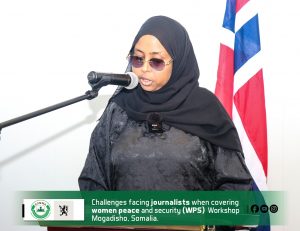 Speaking at the event’s opening, the deputy minister of family and human rights, Hon. Hanaan Abdiasis Barre, stated that they recognized the numerous obstacles that journalists encounter, including security issues, societal biases, and institutional constraints that hinder gender-sensitive reporting.
Speaking at the event’s opening, the deputy minister of family and human rights, Hon. Hanaan Abdiasis Barre, stated that they recognized the numerous obstacles that journalists encounter, including security issues, societal biases, and institutional constraints that hinder gender-sensitive reporting.
However, she reiterated that one cannot overstate the role of media in shaping the public narrative, amplifying women’s voices, and holding stakeholders accountable.
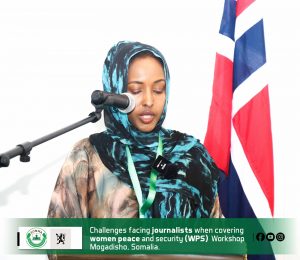 Maryan Seylac, SOMWA’s executive director, who was representing the CSOs and spoke as a keynote speaker, stated that the impact of media on women’s political participation in Somalia is not a profession for her but a deeply personal one: “It represents the aspirations and struggles of countless Somali women who wish to make their voices heard in shaping the future of our nation,” said Seylac. However, for Somali women seeking political inclusion, media serves as both a challenge and an opportunity.
Maryan Seylac, SOMWA’s executive director, who was representing the CSOs and spoke as a keynote speaker, stated that the impact of media on women’s political participation in Somalia is not a profession for her but a deeply personal one: “It represents the aspirations and struggles of countless Somali women who wish to make their voices heard in shaping the future of our nation,” said Seylac. However, for Somali women seeking political inclusion, media serves as both a challenge and an opportunity.
By convening key actors from various sectors, the workshop fostered an environment of open dialogue and mutual learning. Participants were encouraged to share their experiences, insights, and innovative ideas, creating a rich tapestry of perspectives on how to overcome systemic biases and operational challenges.
This collaborative approach was essential not only for identifying problems but also for developing a shared commitment to transformative change. The workshop underscored that only through coordinated efforts—encompassing policy reform, capacity building, and enhanced security measures—could the media’s role in advancing the WPS agenda be fully realized.
Ifrah Noor, journalist and producer, co-founder and director of Keena Africa, and one of the panellists, argued that without enough women in power and decision-making roles, the peace and security agenda is male-dominated, which hinders women’s political participation.
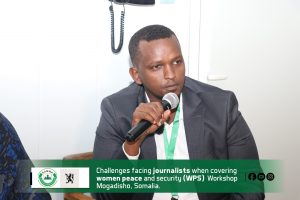 However, Abdiqani, a senior media advisor who was among the panelists, thinks that there are not enough female journalists to cover every topic—for example, security and health—and the Somali media needs to produce more educated women who can cover these issues. However, a female participant expressed dissatisfaction with Abdiqani’s claim, stating that while there are many women journalists capable of covering these topics, media outlets often deny them, favouring males instead.
However, Abdiqani, a senior media advisor who was among the panelists, thinks that there are not enough female journalists to cover every topic—for example, security and health—and the Somali media needs to produce more educated women who can cover these issues. However, a female participant expressed dissatisfaction with Abdiqani’s claim, stating that while there are many women journalists capable of covering these topics, media outlets often deny them, favouring males instead.
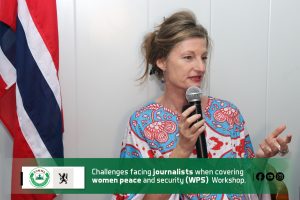 Kirsten Young, Chief, Human Rights and Protection Group UNTMIS, Representative, Office of High Commissioner for Human Rights, who was among the panelists, stated when she was discussing the challenges facing journalists reporting WPS, especially women encountering obstacles, for example, being given softer issues, she talked about workplace harassment, which her office receives cases that become unsuccessful to establish as cases like this require at least 3 independent witnesses, and with culture, it is challenging to be successful.
Kirsten Young, Chief, Human Rights and Protection Group UNTMIS, Representative, Office of High Commissioner for Human Rights, who was among the panelists, stated when she was discussing the challenges facing journalists reporting WPS, especially women encountering obstacles, for example, being given softer issues, she talked about workplace harassment, which her office receives cases that become unsuccessful to establish as cases like this require at least 3 independent witnesses, and with culture, it is challenging to be successful.
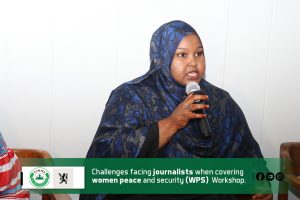 Talking about if the media in Somalia covers WPS, Ifrah Noor argued that it all depends on the mindset of the media outlet we are talking about, but she highlighted that often the media covers women as a victim, not as a leader. Workshop Outcomes The workshop on “Challenges Facing Somali Journalists in Covering the Women, Peace, and Security Agenda” yielded several significant outcomes that mark an important step forward in addressing the multifaceted challenges identified during the sessions.
Talking about if the media in Somalia covers WPS, Ifrah Noor argued that it all depends on the mindset of the media outlet we are talking about, but she highlighted that often the media covers women as a victim, not as a leader. Workshop Outcomes The workshop on “Challenges Facing Somali Journalists in Covering the Women, Peace, and Security Agenda” yielded several significant outcomes that mark an important step forward in addressing the multifaceted challenges identified during the sessions.
These outcomes are instrumental in shaping a more inclusive and resilient media landscape in Somalia, particularly in relation to gender-sensitive reporting.We achieved the key outcomes listed below:Increased Awareness of Structural Challenges One of the foremost outcomes of the workshop was a heightened collective awareness among participants regarding the systemic obstacles that hinder gender-sensitive journalism in Somalia.
Through in-depth discussions and case study presentations, participants gained a clearer understanding of how cultural stereotypes, institutional barriers, security risks, and economic constraints intertwine to restrict the voices of women in media.
This enhanced awareness has not only sensitized journalists and media stakeholders to the pressing need for reform, but it has also laid the groundwork for future collaborative efforts aimed at dismantling these structural impediments.
Commitment from Media Organisations A noteworthy outcome of the workshop was the expressed commitments from various media organisations to embrace and implement gender-sensitive policies and ethical reporting standards. Recognising the pivotal role that the media plays in shaping public narratives, several leading media houses pledged to reevaluate their editorial practices and internal policies.
